
Construction company employee
Sponsored by the Moriguchi R.C.
Introduction
"Five weeks? That's a long time," said my friend.
"Yes, it is,"I replied," but it will go by just like that."
"Welcome back. Are you tired out?" said my friend.
"I just got back. But, I had a good time," I answered with a smile.
These were the dialogues that I had envisioned having, before I actually went to the Netherlands. I did not see how they could be different, considering the GSE program. As the day of my departure grew closer, that feeling grew stronger.
As I remember, my happening to see a newspaper article stating that the Rotary was looking for GSE team members was the beginning of the best days of the greatest event of my life. Everything went smoothly to help me achieve this. From my eyes just happening to see the article in the newspaper, to my receiving an explanation of the program from GSE Chairman Mr. Nomura when I called, to being recommended by the Moriguchi Rotary Club, and, most of all, being chosen by the GSE Committee; if even one of these things had not happened, the present me would probably not exist. I want to use every expression of gratitude found in the dictionary to thank Governor Kondoh, everyone on Chairman Nomura's D-2660 committee, the Moriguchi Rotarians, and those who welcomed me in D-1560 for turning my luck into happiness. I do not know how to adequately express my thankfulness to everyone, but please continue to look after me as I grow. If you still feel that your choosing me to be a GSE team member was a good thing, I will be able to think for the first time that I have returned the favor of being chosen.
The Rotary Clubs I Visited
Club #1 Neede
The first people I met when I arrived at the airport were the Rotarians of Neede. Neede is in the easternmost part of this district, and it borders with Germany. It felt like it took a couple hours to get to my temporary residency, but the Rotarians so nicely explained different things and told jokes that it was not a difficult journey at all. One of the people who came to meet me at the airport was my host father, and when we got to his house, everyone was waiting for us. I cannot express how I felt at that moment. Everyone came and met me with beaming smiles, and at that moment I became "family" to them. Some people sang and even started dancing.
Both of my host parents were there from the morning through to the night, so I was able to spend my time in a peaceful and leisurely way, as if I was at home. Thanks to them, I was able to look forward to the rest of my stay in the Netherlands eagerly. The day after I arrived, my host Daddy and Mommy, and their son, and I went out on a walk together. We had a wonderful time walking and talking in the beautiful scenery, and stopping to do some birdwatching. As I listened to the many birds singing cheerily, I felt that my trip had really started.
Of course, my host parents were not the only people
who worked to make my trip enjoyable; everyone who met me was helpful. The Rotarians
were especially kind. In the four days that I was with them in this area, I
really felt that this Rotary Club, especially, was on happy family, and I felt
this from the moment I first met them. It wasnft
so much, "Who is whose host family?", but rather it was like we were all in
one family.
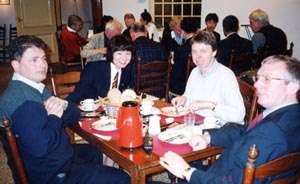
They were really warm, friendly people. Even people who were not in my host family took care of me. I think that my nationality, age, and circumstances did not matter to them. Their personalities are such that they just like people, I think. I am very glad to have been blessed with the chance to meet them. It is something I will always treasure.
Club #2 Doetinchem
On April 25, I bid a tearful farewell to my friends in Neede, and was taken
directly to my next host family's house. I learned that there are many different
things about each club. In this club, the host family had two elementary school
boys, and I was able to get a taste of primary school life in the Netherlands.
I was most impressed by the fact that the boys spoke almost perfect English,
and showed an interest in me, and were very kind to me, even though I was the
first Japanese person they had ever met. This is what we Japanese need to learn
to do the most, I think. Every night after supper, until bedtime (at midnight),
was "talking time," during which we talked about many things while elegantly
holding a cup of wine in one hand. With the scary faces of my joke-loving host
"Daddy," my host "Mommy's" resemblance to the late Princess Diana of England,
my talk about Japan and my work, and talk of countries that we had been to,
there was no end to the conversations. I did not get to spend so much time with
other Rotarian families in this area, but with my host family, I was able to
understand their family life. Those were precious days to me.
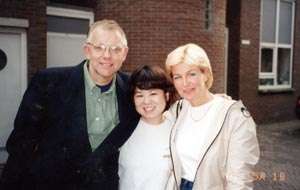
Club #3 Harderwijk
After having supper with the whole family on May 1, I moved on to the next
club. Again, it was with tears that my host family and I separated. At the next
club, the coordinator of the Rotary Club owns a hotel, and we were able to stay
there that night. All we had to worry about the next day before meeting our
next host families was the meeting time and our clothes. That was nice and simple.
My host family consisted of a father who was precise in matters of time and
apparel, and a mother who was very gentle and quiet and a good cook. They bought
me a pair of real wooden shoes, took me cycling, and gave me "typical Dutch"
experiences. There was a piece of land called "New Land" that was formed by
pumping the water out of it close by, and I went to see many pump facilities
while I was there. The workers there said confidently, "If it's about water,
ask us," and among them were some who had come to work on the Kansai International
Airport. As we drove along the long road which was on top of a dike, I could
see the incredible spectacle of the water on one side being higher than the
land on the other. I wondered about the people who live on that land. "Don't
they worry about flooding?" On the weekend, I went to Amsterdam, and for the
first time felt that I was a tourist. Because the places we visited were so
wonderful and because the schedule set up by the R. C. was so congested, there
wasn't a lot of time to talk and ask questions (but the places we visited were
really wonderful).
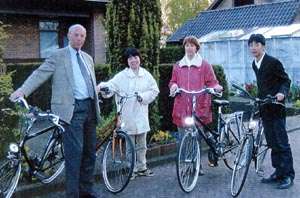
Club #4 Bennekom
May 8, the last day of my stay at club in Harderwijk, was spent at the hotel.
After dinner, I went to the next club. At this club, as well, all of the host
families gathered together to greet us. Everyone was casual, and it all reminded
me of my stay at Neede. Sunday (which was as "free day" with our host families),
was Mother's Day, and I was able to watch each of the three children give their
presents (which they probably mulled over frantically before choosing) to their
mother. As if I were not there, the father and mother ran around in the yard
barefoot, and spent the day lying around and spending time with the family,
and I was able to see their life-style as it normally is, without any changes.
They must have thought of me not as "special family," but "real family." It
made me think, "This may be what real happiness is. The thing that we Japanese
are missing, but need, could be leisure of heart." Those five days were truly
pleasant and wonderful days. I well recall how, every morning, I would take
the dogs for a walk while going along with the children as far as their elementary
school, where all of the students stared at me as if I were an entertainer.
The weather was so beautiful that my face and arms were sunburned. I never imagined
I would get sunburned in the Netherlands!
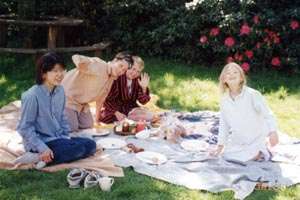
Club #5 Arnhem
On May 14, I bid an emotional farewell to my host parents (it seemed like I
was always doing this!), and went on to the next club. My new host parents were
both Rotarians. They were an active couple, with their common interests being
golf and grass hockey. Once, when I simply said, "Japanese can't imagine just
walking across a border from one country into another," they replied, "Well,
then, let's go to Germany today." After a very simple supper, they took me to
Germany in their car to do some sight-seeing. However, on the way back, they
stopped the car and said, "Let's cross over the border on foot." They went out
of their way to walk with me over the border line. I noticed that they were
good, steady walkers, and when I thought about how they were doing this ungrudgingly,
just for me, even though they were probably tired, I felt so happy that I thought
I was going to cry. At this home, also, we talked until midnight. They both
had great personalities and they were very smart, so they were able to keep
the conversation going. It was really lots of fun for me. The bond between Rotarians
is very strong. They said, "Let's talk together until your ride comes," and
I think they have many opportunities to talk to all kinds of people.
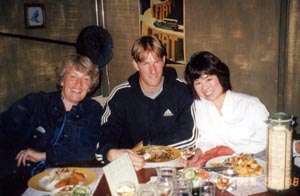
I went to GSE day with my host mother, and on the way home she said, "Since we've come this far ...," and she decided to take me to the city of Delft for some sight-seeing. What a "coincidence" we encountered at that time! The Dutch, German and British Rotarians who had come to that day's meeting noticed our Rotary suits and Rotary insignias and came up to talk to us. Again, I felt the strength of the "bond between Rotarians."
The Last Club Apeldoorn
On May 20, after seeing a soccer game (Arnhem Vittesse) during the day, we
went to the club where we would be spending our last week in the Netherlands.
Of course, my second-to-last host family and I cried as we parted. I was blessed
to the very last by my host families. The mother of my last host family was
a Rotarian. Unless there was a good reason, we usually ate outside. In the morning,
my host father would cheerfully say, "Since the weather's so nice, let's eat
outside," before proceeding to get breakfast ready. Also, even though she was
very busy, my host mother held a garden party for all of the GSE team members,
saying, "Because I like parties so much." Of course, all of the host families
came, too. A barbecue was planned, and I helped a little bit, but, in the end,
my host father and mother did all of the work. Of course, all of the host families
brought many things to the barbecue, and although many brought the same type
of meat, there were so many different seasonings and varieties to try. It was
a fun dinner.
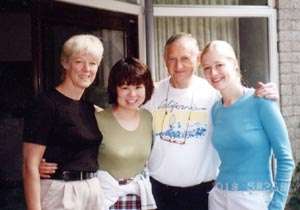
After the district farewell party, when I was given a choice of going to a concert or returning to the house, I naturally said, "I want to spend time with my host family." I wanted to be with them as much as I possibly could. Up until the last moment we had together on the last day, we talked and laughed as usual, and said "See you later," when we parted.
Vocational Study
I thank all of the Rotary Clubs from my heart for giving me chances to study different vocations in the Netherlands. I was able to go on six study trips, and I will explain each one here simply.
1. At Neede, I went to my host father's colleague's company, where I was shown a real construction work site. I was shown the plans of the project and the making of a foundation, and I was able to see how Dutch and Japanese construction methods are different. I felt that the main difference was the way that the foundation was built.
2. In Doetinchem, I went to a recycling company and saw how materials left over from construction sites (such as paper, lumber, and asphalt) were recycled in a way that Japan does not do. I sadly believe that Japan has neither the facilities nor the legislation to recycle the way that the Dutch do right now.
3. After receiving an explanation of a city development plan in Harderwijk, we went to a construction site by bicycle. Although it was a very interesting project, it was bitterly disappointing for me to have to follow the others to the site in a downpour after I brushed aside the advice of the Rotarians to go by car. Rainwater dripped off my head, and I could not see what I wanted to in the downpour.
4. In Arnhem, I was taken to my host mother's acquaintance's architecture office. From a Japanese person's perspective, private businesses designing a city hall is unheard of, but that is the way things are usually done in the Netherlands. I was also surprised that in the Netherlands, plans are made for large areas at a time, such as the open space in front of a station, instead of making plans for one building or one road at a time.
5. In Apeldoorn, I went to another city hall and toured some historical buildings. This town is taking the initiative to repair monuments and historical buildings and working to save them for future generations. This one town is the only town in the Netherlands to have a position called "monument advisor," and it appears that other cities and towns sometimes ask Apeldoorn for help in these matters. In Japan, the tendency to tear down the old and build the new seems to be strong. What a waste! In particular, when I think of the big streets in Osaka, such as Midosuji, I think that the destruction of historical buildings is a problem that must be thought about seriously in Japan.
6. I would like to write in more detail about my last visit, which was to SMIT
INTERNATIONAL in Bennekom. I do not think that many people know what SMIT does,
but when I say that it helped in the raising of the "Ehime Maru", many people
would say "Ahh" in comprehension. I doubt many people know this, but SMIT is
a company from the Netherlands. Actually, I first heard about this company on
the news on TV one week before I left for the Netherlands. By chance I heard
the word "Holland," and I really wanted to go see SMIT, although I honestly
thought it was hopeless to do so at first. I still asked the D-1560 GSE coordinator
about it, anyway. I should have had more faith in the GSE! Just when I had about
given up my dream, I found out that I would be able to visit SMIT, thanks to
the club's help. However, in response to my first question at SMIT, I was told,
"I can't tell you anything about the raising of the "Ehime Maru". The US Navy
is our client," and that topic was taboo. However, I was taken to the maintenance
plant and where tugboats were anchored, and received two documentary videos;
it was a wonderful trip. The Rotarian who took me said, "Because of you, Rika,
I was able to have a very wonderful experience," and it warmed my heart all
day long. I am so thankful to Ms. Ingrid Stuij for working very hard to set
up a trip that had not been planned.
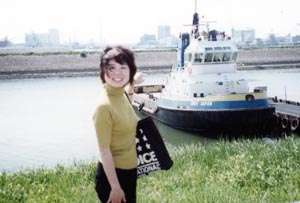
Our GSE Presentation
The first thing that we GSE team members did before leaving for the Netherlands was to prepare for our presentations. We were looking at the presentations of previous GSE members as a basis for ours, but I suggested that we do something fantastic, "Let's not copy what others did, but make presentations as only we can do. Even if our way does not work out, it will be useful to others later on." All of the GSE team members except for Ms. Umeda disapproved of my idea. However, I wanted to make a presentation that would bring out our individual characters. In other words, we could each show the people in the Netherlands something traditional from our country. My basis for this was the saying, "Hearing it a hundred times is the same as seeing it once." My idea was eventually accepted, and we were able to begin planning who would say and do what things for how long.
Our presentation may have been a bit "unique," but it became well known in the Netherlands, and of course, none of the Rotary clubs had ever seen anything like it. Even a chairman of a Rotary club, who was not a part of the GSE trip and who I had never seen before, said, "I would like to see part of your presentation." When I heard things like that, I felt really happy that I had kept pushing my idea on the other team members. At the same time, I feel very thankful to the GSE team members who accepted my idea.
Things that surprised me
It must be that the Dutch do not get to meet Japanese often, but the people we met in D-1560 (even on vocational study trips) were given several sheets of paper to read over before they met us. These papers were an explanation of how to treat Japanese. It was a very long explanation, covering two or three B5 pages, and these were full of instructions such as, "Do not open presents you receive from Japanese in front of them. If you want to open it, ask the person who gave it to you if you may first." "Japanese eat noodles (meaning instant ramen) regularly, so be sure to prepare some for them." "Always say san after the Japanese person's name." "Japanese will want to eat rice, so be sure to ask them if they want some as often as possible." "Calling a Japanese person by their first name is rude, so call them by their last name. However, first ask how to pronounce their name." These, and other things like them, were written on these papers. When I read this, I thought in amazement, "They still have no idea what Japan and Japanese people are like," but then I wondered, "I wonder how much I actually know about the Netherlands and the people who live here." I realized that "I don't know anything about them, either!" I thought, "So that we can both understand each other, I need to act and speak so that I am not embarrassed to be Japanese." Because of that, many people in the Netherlands said, "Rika, you're different from the Japanese the explanation talks about." "How?" I asked. They commended me, saying, "Well, it says here that Japanese will not clearly say 'Yes' or 'No' to your questions, so you need to ask the same question over and over again, but you answer questions nice and clearly." I would always say repeatedly, "Please think of me as the opposite of all that is written in there." Many people said, "Because of you, Rika, my view of Japanese people has changed. I used to think that Japanese were ineffable and hard to deal with, but I found out that they actually are friendly and fun people." I took those people's comments as words of praise. My host families always made delicious foods, and even prepared the "typical" Japanese food, rice. It was no problem for me to eat things I'd never eaten before. All of the meals I ate there were familiar tastes, and I could eat everything. Also, I knew proper Western manners to some extent, and I was able to learn some special manners of the Netherlands as I watched others. I was able to remember these for later. I am thankful to my parents who brought me up to be able to eat all foods and taught me the basics of Western eating manners so that I could go out to eat and not be embarrassed.
Lastly
Before the district farewell party started, we met with the coordinators of the program and shared our opinions about the program for the last time. We were asked, "Please tell us how you felt about the program as a whole," and each of the GSE team members answered. This is what I said. "I will say just one thing. I am touched by how wonderful everyone was, and grateful to them all. I am sure that the program was so wonderful because everyone involved was so wonderful. Even if the schedule had been absolutely perfect, if the people had been bad, it would not have been good. Rather, even if there was a small mistake in the program, but I could feel everyone's sincerity, heartiness, and love, the time we spend together would be the best I ever have. To me, people are everything, and without love, nothing will start or succeed. Thanks to you, the past five weeks were so wonderful I wouldn't trade them for anything. It is impossible for me to express my gratitude to you, but I am sure that since you have been with me, you understand what I mean. Thank you very, very much."
The party began, and as I talked with everyone, some people praised me, saying, "Because of you, Rika, we were all able to relate to each other with love. Not because of anyone else. It was because you are who you are. You stirred up the team's atmosphere, and led us to success." When I heard these words, I cried... I don't think I will ever forget those words. I found that I, who had thought I had no special abilities, had the special ability to be a "moodmaker," and I was able to become a bit more confident. The time we spent together in the Netherlands was much more than "vocational study." It was the study of a person named Rika Hirashima. I think that the way that I use my treasured experiences in the Netherlands will be the test of who I really am.
If I were to write down the names of all of the people who took care of me in the Netherlands, I think their names would take up the space allotted for the whole report, but I want to at least write the names of my host parents. They are: Tonnie and Ricky, Mindert and Dittie, Jan and Fina, Palko and Jacqueline, Frank and Rita, and Frans and Maria. To them, I want to say a special thanks from my heart.
I would like to close with the words I shared when I said good-bye to someone in the Netherlands.
"I'm not going to say, 'Good-bye.' I will just say, 'See you.'"